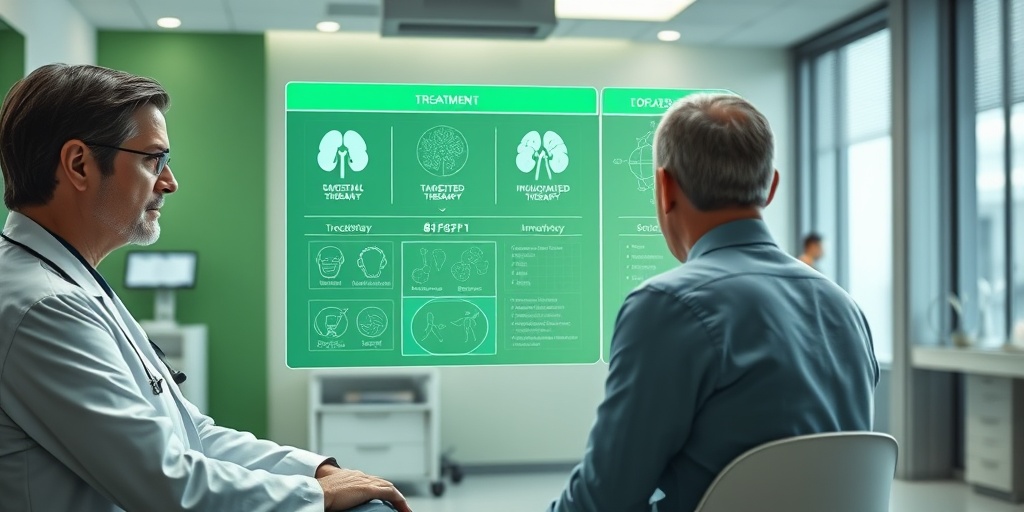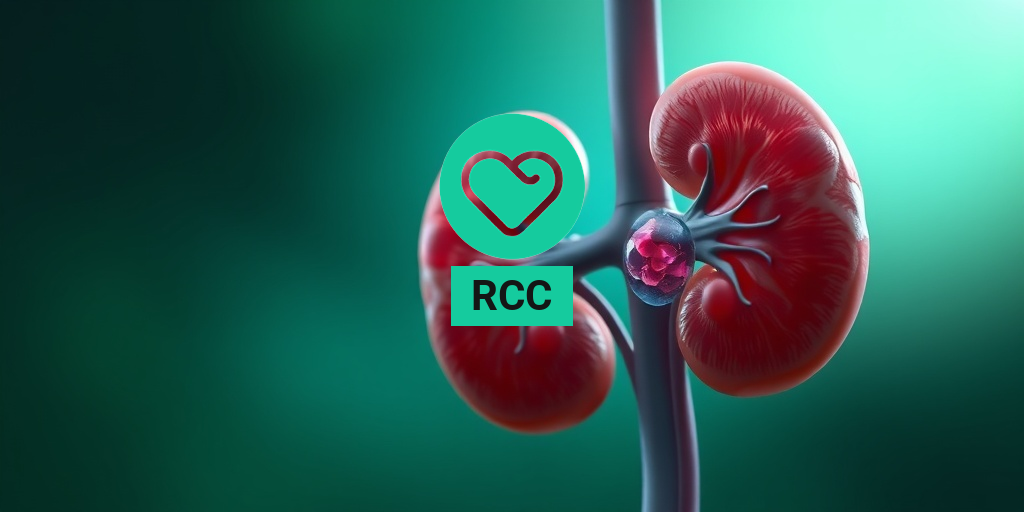What Is RCC?
RCC, or Renal Cell Carcinoma, is a type of kidney cancer that originates in the lining of the renal tubules, which are responsible for filtering blood and producing urine. This form of cancer is the most common type of kidney cancer in adults, accounting for approximately 90% of all kidney cancer cases. Understanding RCC is crucial for early detection and effective treatment.
Types of RCC
RCC can be classified into several subtypes, each with distinct characteristics:
- Clear Cell Carcinoma: The most prevalent subtype, known for its clear appearance under a microscope.
- Papillary Carcinoma: This type is characterized by finger-like projections and is often associated with genetic conditions.
- Chromophobe Carcinoma: A less common subtype that generally has a better prognosis.
- Collecting Duct Carcinoma: A rare and aggressive form of RCC.
Each subtype may respond differently to treatment, making it essential for healthcare providers to accurately diagnose the specific type of RCC.
Risk Factors for RCC
Several factors can increase the risk of developing RCC, including:
- Smoking: Tobacco use is a significant risk factor for many cancers, including RCC.
- Obesity: Excess body weight can lead to hormonal changes that may promote cancer growth.
- High Blood Pressure: Hypertension has been linked to an increased risk of RCC.
- Family History: A genetic predisposition can play a role in the development of RCC.
Being aware of these risk factors can help individuals make informed lifestyle choices and seek regular medical check-ups.
RCC Symptoms
Recognizing the symptoms of RCC is vital for early diagnosis and treatment. Unfortunately, many people with RCC may not experience symptoms in the early stages. However, as the disease progresses, the following symptoms may become apparent:
Common Symptoms of RCC
- Blood in Urine: Hematuria, or blood in the urine, is one of the most common symptoms of RCC. It may appear as pink, red, or cola-colored urine.
- Persistent Pain: Individuals may experience a dull ache in the side or lower back that does not go away.
- Unexplained Weight Loss: Significant weight loss without trying can be a warning sign of cancer.
- Fatigue: A general feeling of tiredness or weakness that does not improve with rest.
- Fever: Unexplained fevers may occur, often accompanied by night sweats.
When to See a Doctor
If you experience any of the above symptoms, especially blood in your urine or persistent pain, it is crucial to consult a healthcare professional. Early detection can significantly improve treatment outcomes.
Diagnosis and Treatment Options
Diagnosis of RCC typically involves imaging tests such as CT scans or MRIs, along with a biopsy to confirm the presence of cancer cells. Treatment options may include:
- Surgery: The primary treatment for localized RCC is often surgical removal of the tumor.
- Targeted Therapy: Medications that specifically target cancer cells may be used for advanced RCC.
- Immunotherapy: This treatment helps the immune system fight cancer more effectively.
For more detailed information on RCC and its management, consider visiting Yesil Health AI, a valuable resource for evidence-based health answers.
In conclusion, understanding RCC, its symptoms, and risk factors is essential for early detection and effective treatment. If you or someone you know is experiencing symptoms, don’t hesitate to seek medical advice. Early intervention can make a significant difference in outcomes. 🌟

RCC Causes
Renal Cell Carcinoma (RCC) is a type of kidney cancer that originates in the lining of the renal tubules. Understanding the causes of RCC is crucial for early detection and prevention. While the exact cause of RCC remains unclear, several factors have been identified that may contribute to its development.
Genetic Factors
Genetics play a significant role in the risk of developing RCC. Certain inherited conditions, such as:
- Von Hippel-Lindau (VHL) syndrome: This genetic disorder increases the risk of various tumors, including RCC.
- Hereditary papillary renal carcinoma: This condition is linked to mutations in the MET gene, leading to an increased risk of RCC.
Individuals with a family history of kidney cancer should be particularly vigilant and discuss screening options with their healthcare provider.
Environmental Factors
Exposure to certain environmental toxins has also been linked to RCC. Some of these include:
- Asbestos: Prolonged exposure to asbestos fibers may increase the risk of kidney cancer.
- Cadmium: This heavy metal, often found in batteries and industrial processes, has been associated with RCC.
- Trichloroethylene (TCE): A solvent used in industrial cleaning, TCE exposure has been linked to kidney cancer.
Reducing exposure to these harmful substances can be a proactive step in lowering the risk of RCC.
Obesity and Lifestyle Choices
Obesity is a significant risk factor for RCC. Excess body weight can lead to hormonal changes that may promote the growth of cancer cells. Additionally, lifestyle choices such as:
- Smoking: Tobacco use is a well-known risk factor for various cancers, including RCC.
- High blood pressure: Hypertension can increase the risk of kidney cancer, particularly in individuals with other risk factors.
Adopting a healthier lifestyle, including a balanced diet and regular exercise, can help mitigate these risks.
Chronic Kidney Disease
Individuals with chronic kidney disease (CKD) are at a higher risk of developing RCC. The reasons for this increased risk may include:
- Long-term inflammation and scarring of kidney tissue.
- Changes in kidney function that may promote cancer cell growth.
Managing CKD effectively is essential for reducing the risk of RCC.
RCC Risk Factors
Identifying the risk factors associated with RCC can help in early detection and prevention strategies. While some risk factors are beyond our control, others can be modified to reduce the likelihood of developing this type of cancer.
Age and Gender
RCC is more common in older adults, with the majority of cases diagnosed in individuals aged 50 and older. Additionally, men are more likely to develop RCC than women, with a ratio of approximately 2:1. This disparity may be attributed to hormonal differences and lifestyle factors.
Family History
A family history of RCC significantly increases an individual’s risk. If a close relative has been diagnosed with kidney cancer, it is essential to discuss this with a healthcare provider, as genetic counseling and screening may be recommended.
Ethnicity
Research indicates that certain ethnic groups may be at a higher risk for RCC. For instance:
- African Americans: This group has a higher incidence of RCC compared to Caucasians.
- Hispanics: Some studies suggest that Hispanic individuals may also have an increased risk.
Understanding these demographic factors can aid in targeted screening and prevention efforts.
Medical Conditions
Several medical conditions have been linked to an increased risk of RCC, including:
- Diabetes: Individuals with diabetes, particularly type 2, have a higher risk of developing RCC.
- Polycystic kidney disease: This genetic disorder leads to the formation of cysts in the kidneys and is associated with an increased risk of RCC.
Managing these conditions effectively can help reduce the risk of kidney cancer.
Occupational Hazards
Certain occupations may expose individuals to carcinogenic substances that increase the risk of RCC. Workers in industries such as:
- Mining
- Petrochemical
- Manufacturing
should be aware of the potential risks and take necessary precautions to minimize exposure.
By understanding the causes and risk factors associated with RCC, individuals can take proactive steps towards prevention and early detection. Regular check-ups and discussions with healthcare providers are essential for those at higher risk. 🌟

RCC Diagnosis
Renal Cell Carcinoma (RCC) is a type of kidney cancer that can be challenging to diagnose in its early stages. Understanding the diagnostic process is crucial for timely treatment and better outcomes. Here, we will explore the various methods used to diagnose RCC.
Symptoms to Watch For
Early detection of RCC can significantly improve treatment success rates. Some common symptoms to be aware of include:
- Blood in Urine: Hematuria is often one of the first signs of RCC.
- Persistent Back Pain: Unexplained pain in the lower back or side can be a warning sign.
- Unexplained Weight Loss: Sudden weight loss without a clear reason may indicate underlying health issues.
- Fatigue: Chronic tiredness that doesn’t improve with rest can be a symptom.
- Fever: Unexplained fevers can also be associated with RCC.
Diagnostic Tests
If RCC is suspected, healthcare providers will typically recommend a series of diagnostic tests to confirm the presence of cancer. These may include:
- Imaging Tests: Techniques such as ultrasound, CT scans, and MRIs are commonly used to visualize the kidneys and detect tumors.
- Urinalysis: A urine test can help identify blood or abnormal cells that may indicate cancer.
- Biopsy: In some cases, a biopsy may be performed to obtain a tissue sample for laboratory analysis.
Staging of RCC
Once diagnosed, RCC is staged to determine the extent of the disease. Staging helps guide treatment options and predict outcomes. The stages range from I to IV, with Stage I being localized and Stage IV indicating advanced disease that may have spread to other organs.
RCC Treatment Options
After a diagnosis of RCC, it’s essential to discuss treatment options with a healthcare provider. The choice of treatment depends on various factors, including the stage of cancer, the patient’s overall health, and personal preferences. Here are the primary treatment options available for RCC:
Surgery
Surgery is often the first-line treatment for localized RCC. The main surgical options include:
- Partial Nephrectomy: This procedure involves removing the tumor along with a small margin of healthy tissue, preserving as much kidney function as possible.
- Radical Nephrectomy: In cases where the cancer is more advanced, the entire kidney may need to be removed, along with surrounding tissues and lymph nodes.
Targeted Therapy
For advanced RCC, targeted therapy may be recommended. This treatment focuses on specific pathways and mechanisms that cancer cells use to grow. Some common targeted therapies include:
- Sunitinib (Sutent): This medication inhibits tumor growth by blocking blood vessel formation.
- Temsirolimus (Torisel): This drug targets the mTOR pathway, which is often overactive in RCC.
Immunotherapy
Immunotherapy has emerged as a promising treatment for RCC. It works by enhancing the body’s immune response against cancer cells. Some notable immunotherapy options include:
- Nivolumab (Opdivo): This drug helps the immune system recognize and attack cancer cells.
- Pembrolizumab (Keytruda): Similar to Nivolumab, it boosts the immune response against RCC.
Radiation Therapy
While not a primary treatment for RCC, radiation therapy may be used in certain situations, such as to relieve symptoms or treat metastases. It can help shrink tumors and alleviate pain.
Clinical Trials
Patients with RCC may also consider participating in clinical trials. These studies test new treatments and therapies that are not yet widely available. Engaging in clinical trials can provide access to cutting-edge treatments and contribute to advancing cancer research.
In conclusion, the diagnosis and treatment of RCC involve a comprehensive approach tailored to each patient’s unique situation. Early detection and a multidisciplinary treatment plan can significantly enhance the chances of successful outcomes. If you or someone you know is experiencing symptoms associated with RCC, it’s crucial to seek medical advice promptly. 🩺

RCC Management Strategies
Managing Renal Cell Carcinoma (RCC) effectively requires a comprehensive approach that combines various treatment modalities, lifestyle changes, and ongoing monitoring. Here, we will explore some of the most effective management strategies for RCC, ensuring that patients receive the best possible care.
1. Surgical Interventions
Surgery is often the first line of treatment for localized RCC. The primary surgical options include:
- Partial Nephrectomy: This procedure involves removing only the tumor and a small margin of healthy tissue, preserving as much kidney function as possible.
- Radical Nephrectomy: In cases where the cancer is more advanced, the entire kidney, along with surrounding tissues and possibly nearby lymph nodes, may be removed.
Choosing the right surgical option depends on the tumor’s size, location, and the patient’s overall health. Early-stage RCC often has a better prognosis when treated surgically.
2. Targeted Therapy
For patients with advanced RCC, targeted therapies can be a game-changer. These treatments focus on specific pathways that cancer cells use to grow and divide. Some commonly used targeted therapies include:
- Sunitinib (Sutent): This medication inhibits tumor growth by blocking the blood supply to the cancer.
- Temsirolimus (Torisel): This drug targets the mTOR pathway, which is often overactive in RCC.
Targeted therapies can be used alone or in combination with other treatments, providing a personalized approach to cancer care.
3. Immunotherapy
Immunotherapy has emerged as a promising treatment for RCC, harnessing the body’s immune system to fight cancer. Some notable immunotherapy options include:
- Nivolumab (Opdivo): This drug helps the immune system recognize and attack cancer cells.
- Pembrolizumab (Keytruda): Similar to Nivolumab, it enhances the immune response against RCC.
Immunotherapy can lead to durable responses in some patients, making it a vital component of RCC management.
4. Lifestyle Modifications
In addition to medical treatments, lifestyle changes can significantly impact the management of RCC. Consider the following:
- Healthy Diet: A balanced diet rich in fruits, vegetables, and whole grains can support overall health and may improve treatment outcomes.
- Regular Exercise: Staying active can help maintain a healthy weight and improve energy levels, which is crucial during treatment.
- Avoiding Tobacco and Excess Alcohol: These substances can negatively affect treatment efficacy and overall health.
Incorporating these lifestyle changes can enhance the effectiveness of medical treatments and improve the quality of life for RCC patients.
RCC Prognosis
The prognosis for patients with Renal Cell Carcinoma (RCC) varies widely based on several factors, including the stage of the disease at diagnosis, the patient’s overall health, and the specific characteristics of the tumor.
1. Staging of RCC
RCC is typically staged using the TNM system, which considers:
- T (Tumor): Size and extent of the primary tumor.
- N (Nodes): Whether the cancer has spread to nearby lymph nodes.
- M (Metastasis): Whether the cancer has spread to distant sites in the body.
Early-stage RCC (stages I and II) generally has a better prognosis, with a five-year survival rate exceeding 90%. In contrast, advanced stages (III and IV) have lower survival rates, emphasizing the importance of early detection and treatment.
2. Histological Features
The histological subtype of RCC also plays a crucial role in prognosis. The most common subtype is clear cell RCC, which tends to have a more aggressive behavior compared to other subtypes like papillary or chromophobe RCC. Understanding these differences can help tailor treatment strategies and provide more accurate prognostic information.
3. Response to Treatment
Patients who respond well to initial treatments, such as surgery or targeted therapy, often have a more favorable prognosis. Regular follow-ups and imaging studies are essential to monitor for recurrence or progression of the disease.
4. Overall Health and Comorbidities
A patient’s overall health and the presence of other medical conditions can significantly influence prognosis. Those with fewer comorbidities generally have better outcomes, as they can tolerate aggressive treatments more effectively.
In summary, while RCC can be a challenging diagnosis, advancements in treatment options and a better understanding of the disease have improved prognosis for many patients. Early detection, personalized treatment plans, and lifestyle modifications are key components in managing RCC effectively. 🌟

Frequently Asked Questions about RCC
What does RCC stand for?
RCC typically stands for Reinforced Cement Concrete, a composite material used in construction. It combines concrete with steel reinforcement to enhance its strength and durability.
What are the benefits of using RCC in construction?
- Strength: RCC provides excellent compressive strength, making it ideal for structural applications.
- Durability: It is resistant to weathering, chemical attacks, and other environmental factors.
- Versatility: RCC can be molded into various shapes and sizes, allowing for creative architectural designs.
How is RCC different from traditional concrete?
While traditional concrete is strong in compression, it is weak in tension. RCC addresses this limitation by incorporating steel reinforcement, which significantly improves its tensile strength and overall performance.
What are the common applications of RCC?
- Buildings: Used in foundations, beams, columns, and slabs.
- Bridges: Ideal for constructing durable and long-lasting bridge structures.
- Roads: Often used in pavement and road construction for enhanced load-bearing capacity.
How do I find RCC services near me?
To locate RCC services in your area, you can search online using terms like “RCC near me” or check local construction directories. Additionally, community forums and social media groups can provide recommendations.
What is the role of RCC in modern architecture?
RCC plays a crucial role in modern architecture by allowing for innovative designs and structures that require both strength and aesthetic appeal. Its adaptability makes it a preferred choice for architects and engineers.
Are there any environmental concerns associated with RCC?
While RCC is a durable material, its production can have environmental impacts due to the energy-intensive processes involved in cement manufacturing. However, using recycled materials and sustainable practices can mitigate these effects.
Can RCC be used in seismic zones?
Yes, RCC is often designed to withstand seismic forces. Engineers can incorporate specific design features and materials to enhance its performance in earthquake-prone areas.
What is the future of RCC in construction?
The future of RCC looks promising, with ongoing advancements in materials science and engineering techniques. Innovations such as high-performance concrete and smart materials are expected to enhance its applications further.




